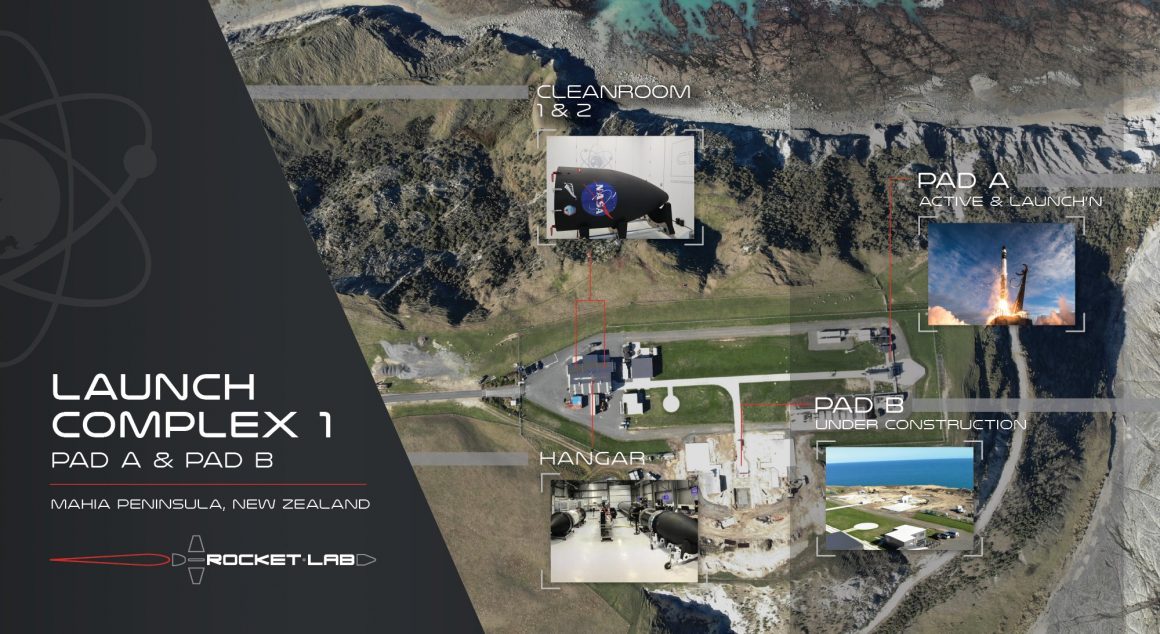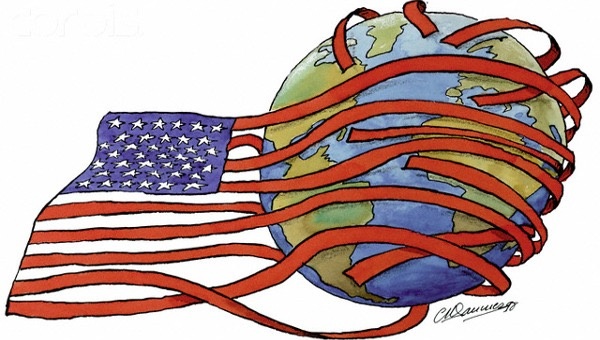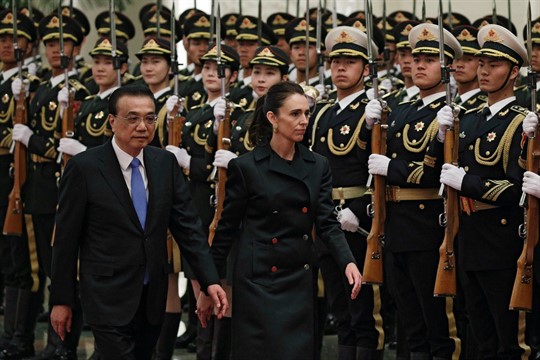How To Best Defend New Zealand From Nuclear War And Climate Change

We often hear from Government and Media spokespeople about the need to support the “international rules-based-order” (IRBO). However, the question needs to be asked, just what ‘rules’ is this order – so vigorously promoted by USA, the UK, Australia, NZ, and other nations in Washington’s orbit – based on? New Zealand’s continued existence might well depend on a successful reimagining of these rules governing Global Politics, so such a goal must be a priority for our Government’s foreign affairs agenda in this term.
The Dig recently ran a most timely item by Robert Patman on the foreign policy challenges facing New Zealand’s new Government. Patman advocates New Zealand adding its diplomatic voice to those nations wishing to revise the status quo as exemplified by the international rules-based-order (IRBO) to which western governed spokespeople, including New Zealand’s are so fond of claiming their allegiance.
The fairness of the ‘rules’ on which the IRBO is based, and for that matter, how ‘orderly’ it’s application is, are a subject of great contention for many, particularly for those in the Global South and non-US-aligned nations. A candid debate about – who wrote, who benefits from, and who is preventing change to – these rules, is long overdue.
Such a dialogue could benefit our entire Civilisation, and indeed our global biodiversity system. It could lead to greater peace-building, less inequality, and more collaboration towards solving the greatest problems we face – Climate change and Global War. Reimagining this system, might seek to build a more multilateral, uncorrupted, global governance system based on the free consent of all nations. It would likely be characterised by more proportionate power and wealth sharing, and more equitable enforcement institutions. It would enable the untapping of vast amounts of potential and ingenuity in the underdeveloped world, and truly create for the first time, an International Community of nations founded on respect and equality.
The International Rules-Based order

Rocket Lab’s private launch site: Launch Complex 1 in Māhia, New Zealand. Source Rocket Lab.
“Our defence engagement with the United States amplifies NZ’s ability to contribute to the international rules-based order and international security and to protect and promote New Zealand’s interests.”
Ron Mark, then NZ Minister of Defence,
The above quote is taken from a recent email from Ron Mark, then NZ Minister of Defence, in answer to a NZ peace activist’s questions regarding military satellites being launched from NZ territory by USA owned company Rocket Lab Ltd. His stated reasoning of supporting the ‘rules-based-international-order’ regularly features in New Zealand’s Defence White Papers. In this September’s issue of the NZ International Review, Defence Minister, Ron Mark, in an article looking back on the achievements of his time in office, mentioned New Zealand’s support for this ‘rules-based-international-order’ no less than six times.

Hon. Ron Mark (L) with Former Deputy PM, Hon. Winston Peters.
Perhaps the question needs to be asked just what ‘rules’ are these on which NZ’s defence policy is based and that the USA, the UK, Australia and other nations in Washington’s orbit so vigorously promote? As would be apparent to any follower of international relations since WWII, these rules suit the nations that have the power to set them more than they suit those that don’t. “Britannia rules the waves and Britain waives the rules!”
To the detriment of all mankind, they have allowed the worst offender to steal an imagined short-term economic advantage by unilaterally tearing up the Paris agreement on climate change. Likewise, the JCPOA, designed to ensure that Iran would not develop nuclear weapons and in return, that its population would be spared crippling economic sanctions, was unilaterally binned by the ‘leader’ of our rules-based-order. Under the present set of rules, torture, assassination, subversion of other nations’ governments, the calculated instigation of hostilities and insurrection through false-flags and the deliberate misleading of public opinion, can be, and have all been carried out with impunity.
These rules have allowed the invasions of Afghanistan, Iraq, Syria, Yemen, Serbia, Libya, the knee-capping by Israeli snipers of hundreds of Palestinian protesters and the displacement of millions of refugees. The system allowed the dropping of 7.5 million tons of bombs on the peoples of Vietnam Laos and Cambodia, and continues to allow untold, long-range terrorisation of populations and sudden death from invisible drones. They allow for the manipulation of the global monetary system to enforce economic sanctions thereby, effectively impairing the livelihoods, health and happiness of a significant percentage of the global population.

Global disorder collapse online by Ingram Pinn
This October, the USA imposed fresh banking sanctions on Covid-19 stricken Iran that will severely limit its ability to provide medical assistance to its population. Amongst so much else, the rules-based-system accepts the deliberate subversion and sabotage of humanity’s attempts at building effective, multinational institutions such as the WHO, the OPCW and the ICC.
A web-search for ‘treaties unsigned or unratified by the United States’ provides a list of international agreements the leaders of ‘our natural allies’, have withdrawn from, refused to ratify, or have ratified and subsequently unilaterally withdrawn from.
These treaties represent the ‘rules’ on which the global system is meant to be based and which NZ claims to be defending.
How can New Zealand keep a straight face? In order to preserve the ‘international rules-based order,’ on which it claims its national security depends, it is, at the same time, training with, cooperating with, and giving the comfort of its publicly demonstrated approval to the instigators of these multiple, abhorrent (and what would amount to, were there a universal and enforceable rule of law – criminal) actions?
If NZ’s national security really depends on its being party to this egregious misconduct, at least New Zealanders should be spared our government’s hypocrisy in calling it ‘a rules based order.’ A spade should be called a spade. Let’s acknowledge the present, so-called ‘rules-based order,’ for what it is: an anarchic playground in which the most powerful and least afraid of using coercion, decide the rules by which less powerful nations have to abide. Such a system bears a closer resemblance to the rule of the jungle than to the international rule of law.

NZ governments should stop pretending. They need either to openly admit that NZ prefers to accept that might is right, or take effective action in support of the international rule of law. To do so would entail a refusal to participate in the present ‘rules based order’ with its inherent aggressiveness, so well exemplified by the obscene tonnage of bombs dropped on defenceless nations and the thousands of drone-traumatised children in developing countries.
Now, New Zealand is being frog-marched into supporting this aggressive alliance in its conflict with China, one of NZ’s two main trading partners. Despite the deliberate distortions in the mainstream (or more precisely ‘corporate’) Western media, China remains a scrupulous supporter of international law and institutions, and has dropped no bombs on anyone.

Robert Patman is completely justified in advocating New Zealand seriously consider joining the Non-aligned Nations Movement, or like solution. The NAM is no longer the force it was in its hey-day, and doing so would involve leadership to resuscitate it as the significant force in global politics that the world is in such want of. There are other organisations, such as the G77, that could also be considered as possible vehicles for a New Zealand diplomatic initiative. In this new era of interconnectedness that Patman so well describes, such a move can only be in New Zealand’s best national interest
NZ adopting such an autonomous policy of neutrality or non-alignment would involve a public disengagement from much of Washington’s rules-based-order. From such a position, instead of giving comfort to Washington, and its satellites by offering at least a tacit approval of their belligerence, New Zealand could then convincingly advocate for the world’s two biggest and most urgent ‘needs.’ These are firstly, reconciliation and peaceful coexistence between ‘eastern’ and ‘western’ blocs and secondly, the empowerment of the United Nations to enable it to ensure that the international community functions under an equitable and effective rules-based-international-order.
No convincing arguments can be made that the US and its allies are not an aggressive force liable to harm those refusing to submit to their self-interested ‘rules.’ It is much easier to find evidence that among those at the receiving end of the West’s aggression, China and Russia, despite the claims of the Western media’s highly effective PR machine, would willingly conform to an international rules-based-system. Such a system would have to be governed through uncorrupted multilateral institutions in which the rules were arrived at multilaterally and with a much larger degree of consensus than seems attainable under the current UN constitution in which the victors of WWII still unjustifiably wield such disproportionate power.
Given that New Zealand’s continued existence might depend on the successful outcome of such an endeavour, such an end would be worth New Zealand’s full and enthusiastic advocacy. The most recent issue of The New Zealand International Review contained an article about how Lichtenstein (population 38,000) has been instrumental in ensuring that waging aggressive war should be universally viewed as a crime against humanity.
Given the will, even the smallest nations can achieve major wins for humanity.
Read More or Comment on The Dig

All Content on The Dig is published under a Creative Commons CC BY license.
View License Deed | View Legal Code
Images on The Dig may be subject to Copyright terms and must be cleared for commercial use.


 Keith Rankin: Equity Rights - UBI, SUI, BUI, HUI, Or GUI?
Keith Rankin: Equity Rights - UBI, SUI, BUI, HUI, Or GUI? Binoy Kampmark: The Inevitable Souring - Elon Musk Falls Out With Donald Trump
Binoy Kampmark: The Inevitable Souring - Elon Musk Falls Out With Donald Trump Ian Powell: Postscript On Ethnic Cleansing, Genocide And New Zealand Recognition Of Palestine
Ian Powell: Postscript On Ethnic Cleansing, Genocide And New Zealand Recognition Of Palestine Gordon Campbell: On Why Leakers Are Essential To The Public Good
Gordon Campbell: On Why Leakers Are Essential To The Public Good Ramzy Baroud: Global Backlash - How The World Could Shift Israel's Gaza Strategy
Ramzy Baroud: Global Backlash - How The World Could Shift Israel's Gaza Strategy DC Harding: In The Spirit Of Natural Justice
DC Harding: In The Spirit Of Natural Justice